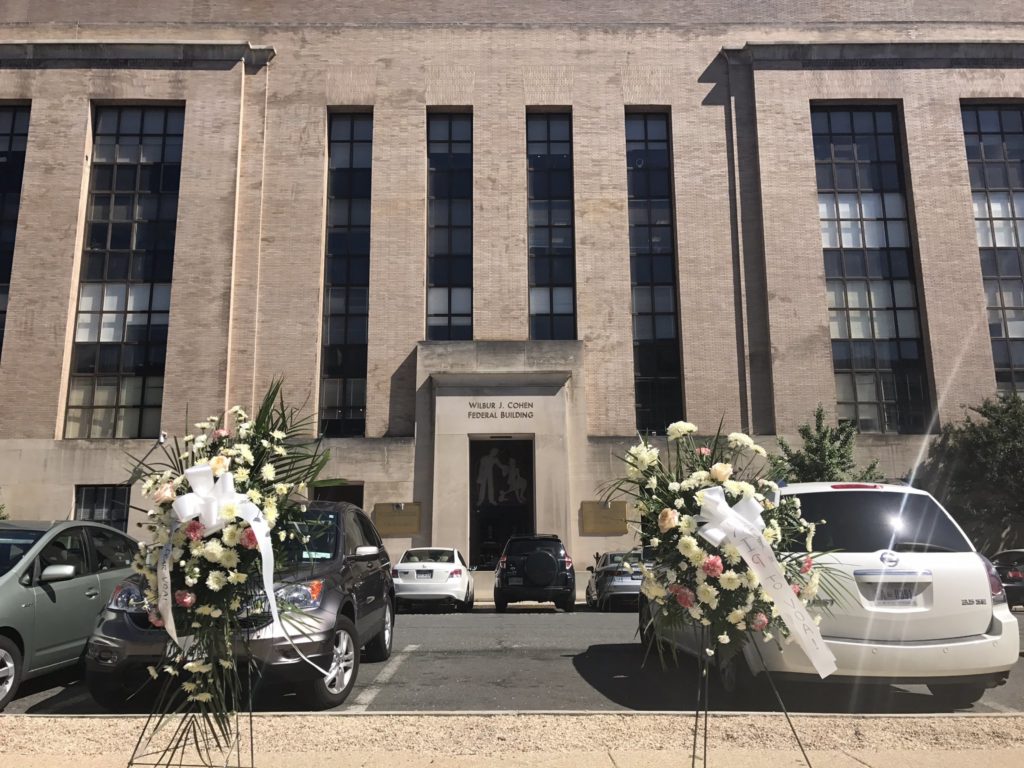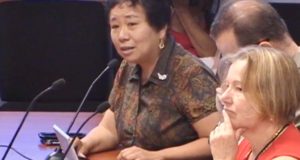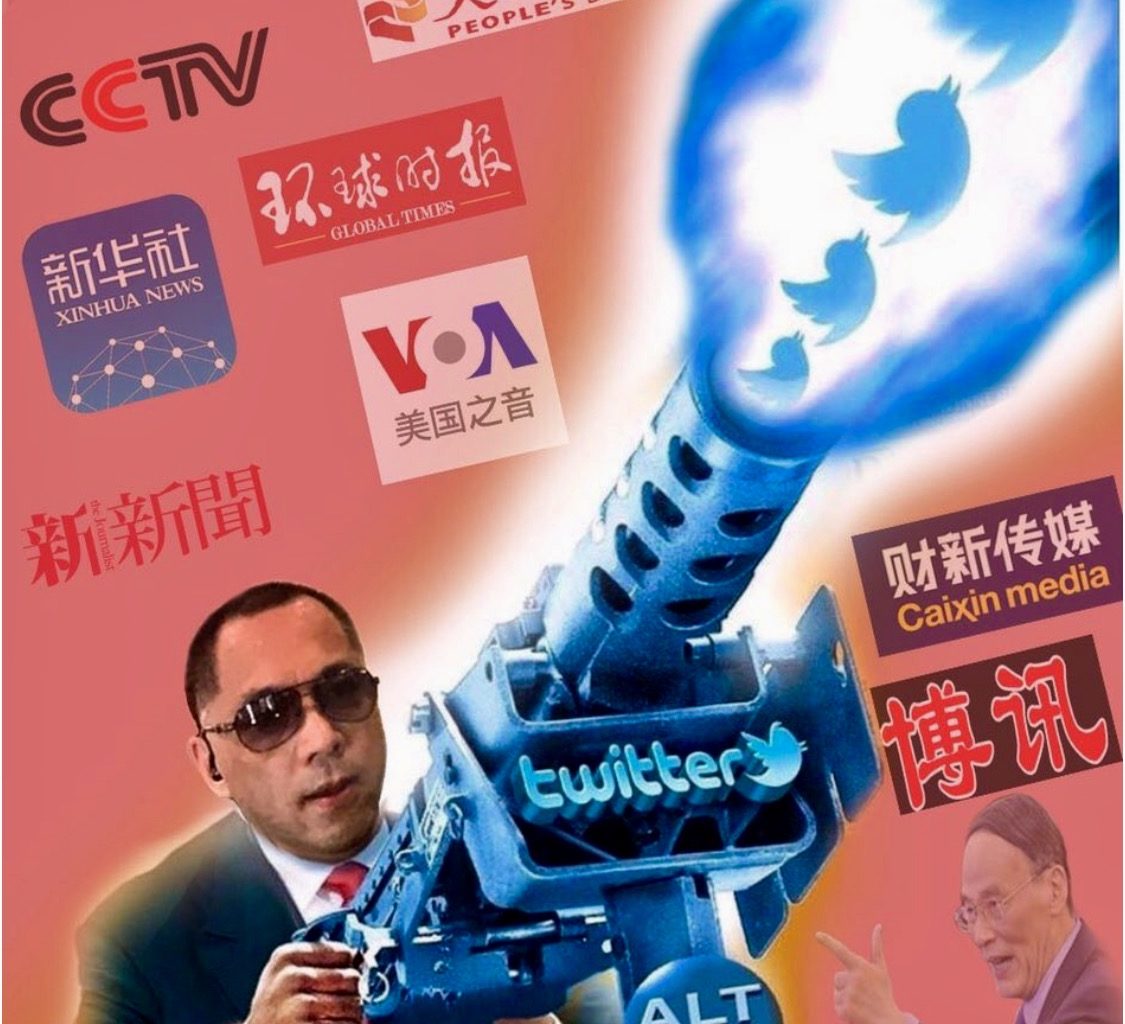BBG Watch Commentary
Chinese maverick billionaire whistleblower Guo Wengui has taken on the Voice of America (VOA), still controlled by holdover Obama era officials, with a meme posted on on Twitter and Facebook showing the VOA logo lumped together with logo’s of China’s censored communist state media, such as the official Chinese Communist Party newspaper People’s Daily and Xinhua, the official press agency of the People’s Republic of China. The meme shows Guo Wengui attacking them with tweets coming out from what looks like a Twitter gun.
The Voice of America’s senior management has angered Guo Wengui, who now lives in the United States, as it has angered many satellite TV viewers and Internet users in China, Hong Kong and among Chinese speakers throughout the world, when on orders of VOA director Amanda Bennett, an Obama administration era appointee, it shortened a live interview with Guo Wengui.
The VOA Mandarin Service initially had promised that the interview would reveal widespread corruption within the Chinese Communist Party and the Chinese government, as well as Chinese intelligence activities targeting Chinese Americans, U.S. politicians, U.S. businesses, U.S. media and other institutions. The live interview was to last three hours, (one hour on TV and two hours in live streaming on Facebook) but it was cut short after about one hour and fifteen minutes on instructions from the VOA director. Because the live VOA interview was shortened, he did not go into details of many of his accusations, some of which were later outlined in a July 11, 2017 Washington Free Beacon article by Bill Gertz, “China’s Intelligence Networks in United States Include 25,000 Spies.”
Voice of America’s management admitted later that the Trump administration had nothing to do with the VOA director’s decision to shorten the Guo Wengui interview. Secretary of State Rex Tillerson confirmed that the State Department had no input into the VOA director’s decision. In response to a question from Senator Marco Rubio (R-FL), Secretary Tillerson agreed in principle to an Office of Inspector General (OIG) investigation of VOA’s handling of the interview.

Many Chinese media users commenting on the incident, which happened in April, are convinced that by shortening the interview, VOA’s management caved in to threats and pressure from the Chinese government. Chinese Americans staged a mock funeral protest against censorship by placing funeral wreaths and carrying a mock coffin in front of the Voice of America building in Washington, DC. VOA director Amanda Bennett categorically denies these charges, insisting that she was only trying to uphold high journalistic standards by wanting to give Chinese communist officials a chance to respond in advance to any allegations of corruption coming from Guo Wengui. Bennett released a statement which said in part:
AMANDA BENNETT: “The decisions regarding the interview with Guo Wengui were made by a group of senior VOA leaders led by director Amanda Bennett and included deputy director Sandy Sugawara, language program director Kelu Chao, and East Asia division director Norm Goodman. At no time during this decision-making process was there any management consideration of not doing the interview, nor of cutting short an ongoing interview for any reason. The decisions were based on the journalistic principles of verification, balance and fairness that are standard industry practice and apply universally to all VOA services.”
Judging by the number of angry and sarcastic comments posted on social media, many Chinese do not believe in her explanation. Bennett has ordered two internal investigations of the incident, in which she and several other senior VOA managers played a key part.

One of the investigators hired by the VOA’s parent federal agency, which is also still run by an Obama era appointee, to conduct a journalistic review of the interview is believed to have done business in China with the approval of Chinese officials and several years ago wrote an editorial urging restraint in American criticism of the Chinese communist government. He was highly recommend by Amanda Bennett for conducting the internal journalistic investigation, which is separate from any OIG investigation. While she and other senior VOA managers continue to work as usual, Bennett ordered five VOA Mandarin Service frontline journalists, including VOA Mandarin Service chief Dr. Sasha Gong to be put on administrative leave with pay while the internal investigation continues. Dr. Gong strongly opposed Bennett’s decision to shorten the Guo Wengui interview. During the internal agency-ordered investigation, a citizen of the People’s Republic of China was allegedly given personal information about the five VOA Mandarin Service journalists.
The Voice of America and the Broadcasting Board of Governors are in general in a state of dysfunction. In 2013, then Secretary of State Hillary Clinton said that the BBG was “practically defunct.” The latest decline of VOA’s reputation and credibility in China caused by VOA management’s decision has been unprecedented and is likely to be made worse by Guo Wengui’s social media meme showing VOA in alliance with the Chinese communist media.
Guo Wengui has a wide social media following in China. While his tweet of the meme showing the Voice of America in the company of the Chinese communist media has already gathered over 2,500 “likes” and over 650 “retweets,” a typical tweet by senior VOA English News White House correspondents usually gets no more than 10 or 20 “likes” and even fewer “retweets.”
VOA journalists who are critical of the current leadership also complain that VOA news content has become politically partisan to an unprecedented degree in violation of the VOA Charter. Some VOA English Newsroom reporters show their personal bias by calling President Trump while at work such names as “pr**k,” “as**ole” and “f**king retard.” One VOA English Newsroom reporter described Trump as “F*ckface Von Clownstick” on a personal but publicly accessible Facebook page. A VOA English Newsroom reporter also posted memes on Facebook for public viewing, showing Donald Trump with a Nazi swastika and Donald Trump as a sex organ. Many other VOA reporters object to such behavior, but it seems to continue.
While the Voice of America’s senior management appears to be in a meltdown state, Guo Wengui’s latest meme, however, may not be fair to many VOA China services journalists who strongly disagree with the VOA director and the leadership of the Broadcasting Board of Governors. The rank and file VOA employees in may of VOA’s foreign language services, as well as some in the VOA Newsroom, want to see the agency reformed by the U.S. Congress and the Trump administration in a bipartisan action. The agency’s Obama era holdover executives have received some of the lowest ratings from employees in government-wide surveys for leadership skills and fostering employee engagement and morale, as noted by a Washington Post columnist. Amanda Bennett is, however, still in charge of the Voice of America, as is her boss, Broadcasting Board of Governors (BBG) CEO John F. Lansing. He is also an Obama-era appointee who has not been yet replaced.
While in the past, the Voice of America sometimes had received criticism from dissidents and others for being too soft on communist regimes at various periods during the Cold War, this appears to be the first time VOA is being bluntly compared to communist media by a dissident whistleblower from a communist country. Such drastic comparisons have not been made before in VOA’s long history and previous VOA directors never allowed similar controversies to get out of control.
While Mr. Guo has the right to be bitter about his treatment by VOA’s senior leaders, his comparison in its totality is not entirely fair to all VOA journalists, as we pointed out, although his criticism of Voice of America and Broadcasting Board of Governors high-ranking officials is certainly well deserved. It is no secret that some of them, both past and present, have done corporate business in communist China and in Putin’s Russia or that family wealth of some of them may depend on doing business in countries where regimes violate human rights of their citizens.
Perhaps the Voice of America could redeem itself by doing some investigative reporting on its own house. We know that such investigative reporting by VOA journalists on their agency’s own leaders is not likely to happen, but a change of the agency’s leadership would be highly welcome by many and is long overdue. If it does not come soon, the current management team may alienate even more whistleblowers and human rights defenders around the world and further undermine VOA’s reputation and credibility. The Guo Wengui meme shows how bad things are currently at the Voice of America and the Broadcasting Board of Governors.
717在国内已经成为无法控制广泛传播的最热们的视频!这是一个盗国贼们永远无法想象的自媒体力量.让假恶丑原形毕露!我深深的感受到.这把火🔥点燃了那一堆干柴烈火!人民在也不会想相信中纪委.王岐山了!盗国贼们的生命从昨天开始倒数了! pic.twitter.com/TKGPpIPvI0
— 郭文贵Guo Wengui ✊️✊️✊️ (@KwokMiles) July 18, 2017
